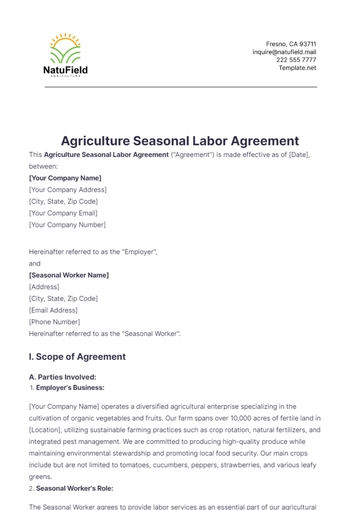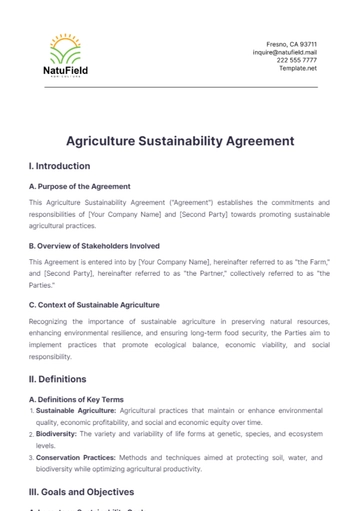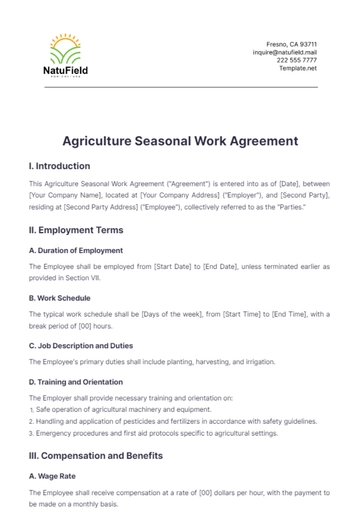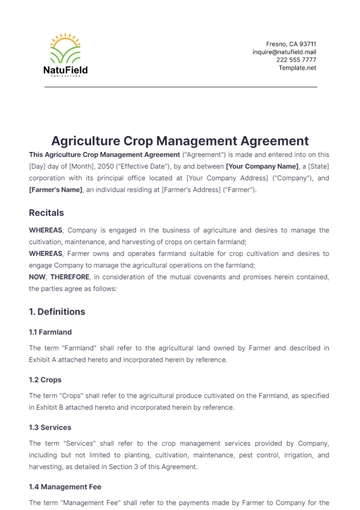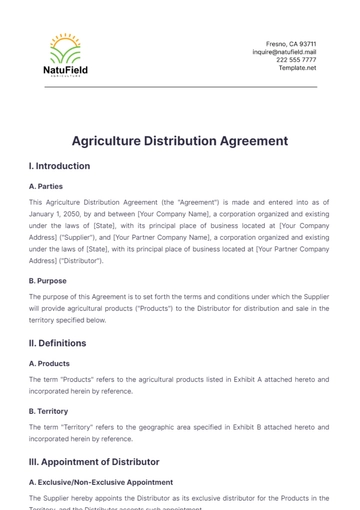Free Agriculture Sustainability Agreement
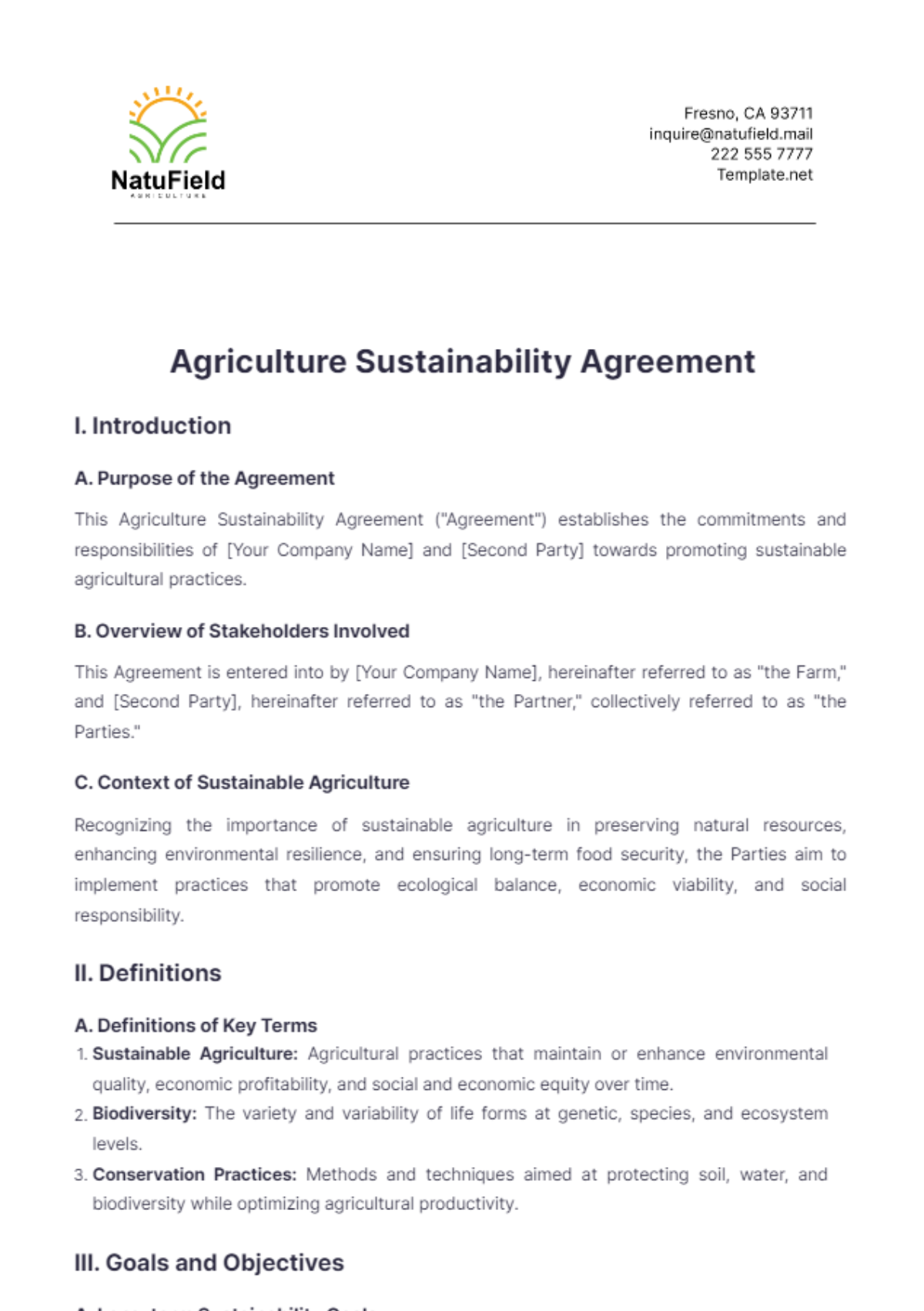
I. Introduction
A. Purpose of the Agreement
This Agriculture Sustainability Agreement ("Agreement") establishes the commitments and responsibilities of [Your Company Name] and [Second Party] towards promoting sustainable agricultural practices.
B. Overview of Stakeholders Involved
This Agreement is entered into by [Your Company Name], hereinafter referred to as "the Farm," and [Second Party], hereinafter referred to as "the Partner," collectively referred to as "the Parties."
C. Context of Sustainable Agriculture
Recognizing the importance of sustainable agriculture in preserving natural resources, enhancing environmental resilience, and ensuring long-term food security, the Parties aim to implement practices that promote ecological balance, economic viability, and social responsibility.
II. Definitions
A. Definitions of Key Terms
Sustainable Agriculture: Agricultural practices that maintain or enhance environmental quality, economic profitability, and social and economic equity over time.
Biodiversity: The variety and variability of life forms at genetic, species, and ecosystem levels.
Conservation Practices: Methods and techniques aimed at protecting soil, water, and biodiversity while optimizing agricultural productivity.
III. Goals and Objectives
A. Long-term Sustainability Goals
Reduce carbon footprint by implementing sustainable farming practices.
Enhance biodiversity through habitat preservation and restoration efforts.
Improve soil health and fertility for long-term productivity.
B. Specific Objectives
Environmental: Implement regenerative agriculture practices to minimize soil erosion and improve water quality.
Social: Ensure fair labor practices and promote community engagement through educational programs and local partnerships.
Economic: Achieve financial sustainability through efficient resource management and diversification of revenue streams.
IV. Commitments to Sustainable Practices
A. Sustainable Farming Practices
Soil Health and Conservation
Adopt no-till farming techniques to preserve soil structure and reduce erosion.
Implement cover cropping and crop rotation to enhance soil fertility.
Water Management and Conservation
Employ drip irrigation systems and rainwater harvesting to optimize water use efficiency.
Implement practices to minimize runoff and improve water retention on the farm.
Biodiversity Conservation
Establish and maintain hedgerows, buffer zones, and wildlife corridors to support biodiversity.
Avoid the use of harmful pesticides and promote integrated pest management practices.
Energy Efficiency and Renewable Energy Use
Upgrade farm equipment to energy-efficient models.
Explore renewable energy options such as solar panels for on-farm energy needs.
B. Social Responsibility
Fair Labor Practices
Provide safe working conditions and fair wages to farm workers.
Implement training programs to promote occupational health and safety.
Community Engagement and Support
Engage with local communities through farm tours and educational workshops.
Support local food initiatives and contribute surplus produce to community food banks.
C. Economic Viability
Financial Sustainability Measures
Develop a diversified revenue strategy that includes direct-to-consumer sales and value-added products.
Monitor and manage operational costs to optimize profitability and long-term financial stability.
V. Monitoring and Reporting
A. Metrics and Indicators for Monitoring Progress
Track soil health indicators such as organic matter content and soil erosion rates.
Monitor water use efficiency and water quality parameters.
Measure biodiversity metrics such as species diversity and habitat connectivity.
B. Reporting Requirements and Frequency
Quarterly reports detailing progress towards sustainability goals and objectives.
Annual sustainability audits conducted by independent experts to assess compliance and identify areas for improvement.
VI. Compliance and Enforcement
A. Responsibilities of Parties Involved
The Farm agrees to implement and maintain sustainable practices as outlined in this Agreement.
The Partner agrees to support and collaborate on initiatives aimed at achieving sustainability goals.
B. Enforcement Mechanisms and Consequences for Non-Compliance
Regular reviews and meetings to evaluate progress and address any deviations from agreed-upon practices.
Escalation procedures for resolving disputes or breaches of the Agreement in a timely and mutually beneficial manner.
VII. Review and Revision
A. Regular Review Schedule
Bi-annual reviews to assess the effectiveness of implemented practices and adjust goals as necessary.
Opportunities for stakeholder input and feedback to inform revisions and updates to the Agreement.
B. Process for Amendments and Updates
Consultation with stakeholders and agreement on proposed changes before formal amendments are made.
Transparent communication and documentation of all revisions to ensure clarity and accountability.
VIII. Stakeholder Engagement
A. Engagement Strategies and Channels
Regular meetings and consultations with local communities, environmental organizations, and regulatory agencies.
Utilization of digital platforms and social media to enhance transparency and promote sustainable farming practices.
B. Consultation and Participation Processes
Involve stakeholders in decision-making processes related to farm management and sustainability initiatives.
Solicit feedback and suggestions for continuous improvement and alignment with community needs and expectations.
IX. Conclusion
A. Summary of Commitments and Goals
This Agreement signifies the mutual commitment of [Your Company Name] and [Second Party] to advance sustainable agriculture practices.
By adhering to the principles outlined herein, the Parties aim to contribute positively to environmental stewardship, community well-being, and economic prosperity.
B. Signatories and Date of Agreement

[Your Name]
[Your Company Name]
[Date]

[Representative's Name]
[Second Party]
[Date]
- 100% Customizable, free editor
- Access 1 Million+ Templates, photo’s & graphics
- Download or share as a template
- Click and replace photos, graphics, text, backgrounds
- Resize, crop, AI write & more
- Access advanced editor
Discover the Agriculture Sustainability Agreement Template on Template.net—an editable and customizable solution designed for farms and stakeholders. Crafted with an intuitive AI Editor Tool, this template streamlines the creation of comprehensive sustainability agreements. Ensure environmental stewardship and operational clarity with easy customization options. Ideal for fostering sustainable practices and fostering community engagement in agricultural settings.
You may also like
- Lease Agreement
- Non Compete Agreement
- Rental Agreement
- Prenuptial Agreement
- Non Disclosure Agreement
- Operating Agreement
- Hold Harmless Agreement
- LLC Operating Agreement
- Arbitration Agreement
- Purchase Agreement
- Residential Lease Agreement
- Executive Agreement
- Confidentiality Agreement
- Contractor Agreement
- Partnership Agreement
- Postnuptial Agreement
- Collective Bargaining Agreement
- Loan Agreement
- Roommate Agreement
- Commercial Lease Agreement
- Separation Agreement
- Cohabitation Agreement
- Room Rental Agreement
- Child Custody Agreement
- Employee Agreement
- License Agreements
- Settlement Agreement
- Joint Venture Agreement
- Indemnity Agreement
- Subordination Agreement
- Sales Agreement
- Agreements Between Two Parties
- Business Agreement
- Real Estate Agreement
- HR Agreement
- Service Agreement
- Property Agreement
- Agreement Letter
- Restaurant Agreement
- Construction Agreement
- Finance Agreement
- Marketing Agreement
- Payment Agreement
- Investment Agreement
- Management Agreement
- Nonprofit Agreement
- Software Agreement
- Startup Agreement
- Agency Agreement
- Copyright Agreement
- Collaboration Agreement
- Reseller Agreement
- Car Rental Agreement
- Cleaning Services Agreement
- Consultant Agreement
- Deed Agreement
- Car Agreement
- Equipment Agreement
- Shares Agreement
- Data Sharing Agreement
- Advertising Agreement
- School Agreement
- Franchise Agreement
- Event Agreement
- Travel Agency Agreement
- Vehicle Agreement
- Board Resolution Agreement
- Land Agreement
- Binding Agreement
- Tenancy Agreement
- Exclusive Agreement
- Development Agreement
- Assignment Agreement
- Design Agreement
- Equity Agreement
- Mortgage Agreement
- Purchase and Sale Agreement
- Shareholder Agreement
- Vendor Agreement
- Royalty Agreement
- Vehicle Lease Agreement
- Hotel Agreement
- Tenant Agreement
- Artist Agreement
- Commission Agreement
- Consignment Agreement
- Debt Agreement
- Recruitment Agreement
- Training Agreement
- Transfer Agreement
- Apprenticeship Agreement
- IT and Software Agreement
- Referral Agreement
- Resolution Agreement
- Waiver Agreement
- Consent Agreement
- Partner Agreement
- Social Media Agreement
- Customer Agreement
- Credit Agreement
- Supply Agreement
- Agent Agreement
- Brand Agreement
- Law Firm Agreement
- Maintenance Agreement
- Mutual Agreement
- Retail Agreement
- Deposit Agreement
- Land Purchase Agreement
- Nursing Home Agreement
- Supplier Agreement
- Buy Sell Agreement
- Child Support Agreement
- Landlord Agreement
- Payment Plan Agreement
- Release Agreement
- Research Agreement
- Sponsorship Agreement
- Buyout Agreement
- Equipment Rental Agreement
- Farm Agreement
- Manufacturing Agreement
- Strategic Agreement
- Termination of Lease Agreement
- Compliance Agreement
- Family Agreement
- Interior Design Agreement
- Ownership Agreement
- Residential Lease Agreement
- Retainer Agreement
- Trade Agreement
- University Agreement
- Broker Agreement
- Dissolution Agreement
- Funding Agreement
- Hosting Agreement
- Investor Agreement
- Memorandum of Agreement
- Advisory Agreement
- Affiliate Agreement
- Freelancer Agreement
- Grant Agreement
- Master Service Agreement
- Parking Agreement
- Subscription Agreement
- Trust Agreement
- Cancellation Agreement
- Horse Agreement
- Influencer Agreement
- Membership Agreement
- Vacation Rental Agreement
- Wholesale Agreement
- Author Agreement
- Distributor Agreement
- Exchange Agreement
- Food Agreement
- Guarantee Agreement
- Installment Agreement
- Internship Agreement
- Music Agreement
- Severance Agreement
- Software Development Agreement
- Storage Agreement
- Facility Agreement
- Intercompany Agreement
- Lending Agreement
- Lodger Agreement
- Outsourcing Services Agreement
- Usage Agreement
- Assurance Agreement
- Photography Agreement
- Profit Sharing Agreement
- Relationship Agreement
- Rent To Own Agreement
- Repayment Agreement
- Volunteer Agreement
- Co Parenting Agreement
- HVAC Agreement
- Lawn Care Agreement
- SAAS Agreement
- Work from Home Agreement
- Coaching Agreement
- Protection Agreement
- Security Agreement
- Repair Agreement
- Agreements License

